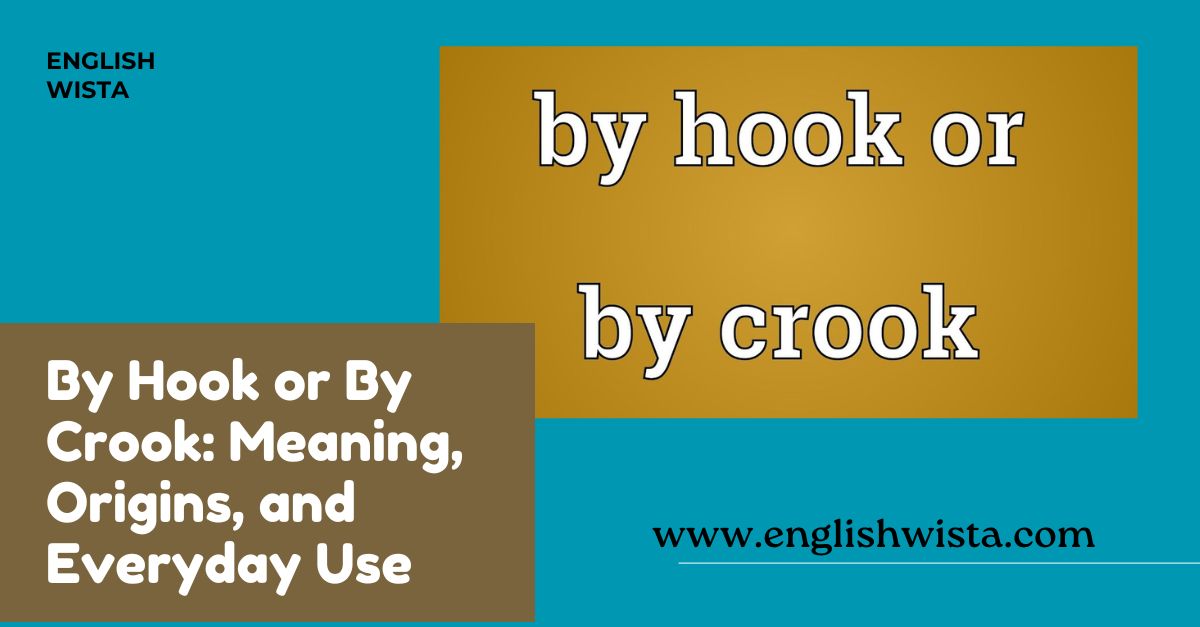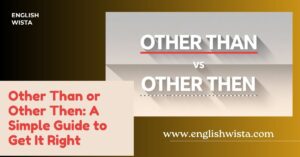Have you ever heard someone say, “I’ll get it done by hook or by crook”? At first, it might sound a little odd. Hooks and crooks? Are we talking about fishing? Shepherds? Pirates? Don’t worry you’re not alone if you’ve wondered about this phrase.
The truth is, “by hook or by crook” is a common English expression that people still use today. It’s short, catchy, and carries a lot of meaning. But what exactly does it mean? And where does it come from?
In this article, we’ll explore the phrase step by step. You’ll learn its definition, history, and how people use it in everyday conversations. We’ll also look at plenty of examples, clear up common confusions, and share some fun facts to make it stick in your memory. By the end, you’ll not only understand the phrase but also feel confident using it yourself.
Let’s dive in.
What Does “By Hook or By Crook” Mean?
At its core, the phrase means: to achieve something by any possible means, whether easy or difficult, fair or unfair.
In simpler words, if someone says they’ll do something “by hook or by crook,” they’re basically saying: “No matter what it takes, I’ll get it done.”
It’s often used when people are determined to reach a goal, even if they have to bend the rules a little or get creative with their methods.
For example:
- “She was determined to pass the exam by hook or by crook.”
- “The company wants to win the contract by hook or by crook.”
So the key idea here is determination at any cost.
Is It Positive or Negative?
That’s a good question! The phrase can sound both positive and negative, depending on the context.
- Positive use: It can show persistence, hard work, or determination. For instance, “He’ll succeed by hook or by crook” can mean he’s very committed to reaching his dream.
- Negative use: Sometimes, it suggests dishonesty or trickery. For example, “The politician stayed in power by hook or by crook” might mean they didn’t play fair.
So, the meaning really depends on how it’s said and the situation it’s used in.
Where Did the Phrase Come From?
This is the fun part. The origin of “by hook or by crook” goes way back, several centuries ago. There are a couple of interesting theories:
- Medieval England law theory: In the Middle Ages, peasants could collect firewood from forests. They were allowed to take any branches they could pull down with a shepherd’s crook (a long stick with a curved end) or a billhook (a cutting tool). This meant they could gather wood “by hook or by crook.”
- Religious story theory: Another idea links the phrase to the Archbishop of Canterbury (William Laud) and a nearby village called “Crook.” One of them supposedly said they would visit both villages “by Hook or by Crook.”
- Literary evidence: The earliest written use of the phrase dates back to the 14th century. Geoffrey Chaucer, a famous English poet, may have hinted at it in his works. Later, in the 1500s, it appeared more clearly in plays and poems.
No matter which theory is true, the phrase has survived centuries and is still alive today. Pretty amazing, right?
How Do People Use It Today?
Even though it’s an old phrase, “by hook or by crook” still shows up in conversations, books, movies, and even political speeches.
Here are some modern examples:
- “I’ll finish this project by hook or by crook, even if I have to stay up all night.”
- “They wanted to win the match by hook or by crook, so they trained harder than ever.”
- “He said he’d get rich by hook or by crook, and he really meant it.”
Notice how in all these examples, the phrase emphasizes determination and a “do whatever it takes” attitude.
Similar Phrases You Might Know
If “by hook or by crook” still feels a little confusing, here are some similar expressions in English:
- “Come hell or high water.”
Meaning: No matter what difficulties come, I’ll do it.
Example: “She said she’d attend the wedding, come hell or high water.” - “At any cost.”
Meaning: I’ll make sure it happens, even if it’s expensive or difficult.
Example: “He wanted success at any cost.” - “One way or another.”
Meaning: I’ll find a way, no matter which one.
Example: “We’ll meet again one way or another.”
All of these phrases share the same spirit: determination and persistence, sometimes with a hint of desperation.
Real-Life Situations Where You Might Use It
To make the phrase stick in your mind, let’s look at a few situations:
- School or college:
“I have to pass this test by hook or by crook. I’ve been studying for weeks.” - Workplace:
“The manager wants the deal closed by hook or by crook, so the team is under pressure.” - Sports:
“The team is aiming for the championship by hook or by crook.” - Everyday life:
“I’m going to get those concert tickets by hook or by crook.”
You can see how flexible it is. From casual chats with friends to serious professional contexts, the phrase fits in many places.
Example Sentences to Practice
Here’s a quick list of sentences you can use to practice:
- She promised her parents she’d get into college by hook or by crook.
- The thief entered the house by hook or by crook.
- He wanted to impress his boss by hook or by crook.
- They said they’d finish the marathon by hook or by crook.
- I’ll reach you by hook or by crook, even if I have to walk all the way.
Try saying them out loud. This will help the phrase become natural in your speech.
Fun Facts About the Phrase
- Longevity: The phrase has been in use for over 600 years! Few English idioms have lasted that long.
- Cultural reach: It’s not just used in England or America. Many non-native speakers use it too, especially because it appears in English literature and movies.
- Catchy rhythm: Part of its charm is its rhythm. The short, rhyming words “hook” and “crook” make it easy to remember.
- Double meaning: The word crook also means a criminal. So sometimes, people enjoy a playful pun when they use it.
Common Mistakes to Avoid
When learning this phrase, it’s easy to make a few mistakes. Here’s what to watch out for:
- Don’t change the wording. It’s always “by hook or by crook,” not “by hooks or crooks” or “with hook and crook.”
- Don’t take it literally. It doesn’t mean someone is using an actual hook or crook. It’s purely figurative.
- Be mindful of tone. Remember, it can sound negative if you’re talking about cheating or dishonesty.
Quick Recap
Let’s review the key points:
- “By hook or by crook” means achieving something by any means necessary.
- It can be used in both positive (determination) and negative (dishonest methods) ways.
- The phrase has medieval origins, possibly linked to tools like hooks and crooks.
- It’s still popular today and appears in many contexts.
- Similar expressions include “come hell or high water” and “at any cost.”
Conclusion
So now you know the phrase “by hook or by crook” inside and out. It’s a short, punchy way to express determination and persistence, whether fair or not. The next time you want to emphasize that you’ll do something no matter what, this is the perfect phrase to pull out.
Think of it like a little piece of history that’s still alive in everyday conversations. It carries the voices of medieval peasants, poets, and even modern professionals. And now, you can use it too with confidence.
So, whether it’s passing a test, landing a job, or just finding your way through a tricky situation, remember: you can always do it “by hook or by crook.”



